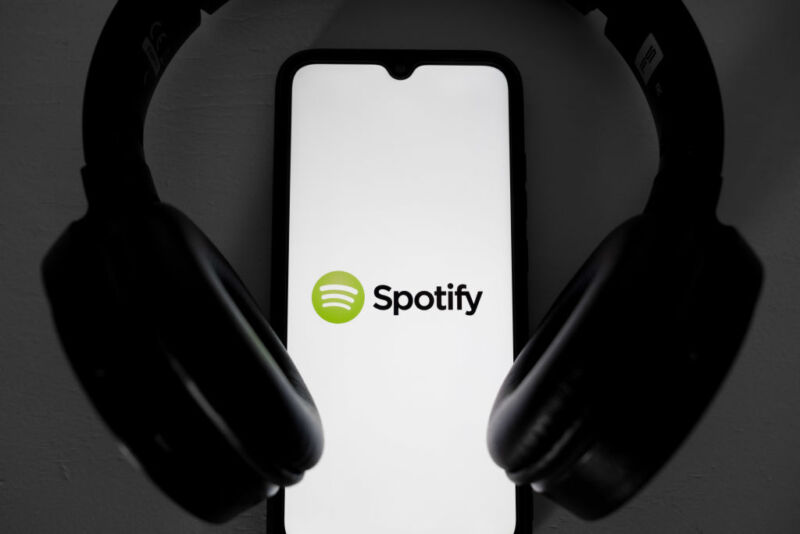Searching for profits —
Bloomberg report claims price hike coming to Australia, Pakistan, and the UK first.

Spotify Premium subscriptions include up to 15 hours of audiobook listening. But starting in April, the company will charge an extra $1 to $2 per month for the feature, Bloomberg reported today, citing anonymous “people familiar with the matter.” The reported price hike would be the second that Spotify customers have faced in nine months.
Currently, Spotify charges nothing for its free plan with ads, $5.99/month for students, $10.99/month for its Premium plan, $14.99/month for its Duo Premium plan for two users, and $16.99/month for its Family Premium plan with up to six users.
Bloomberg reported that individual plan prices will go up by approximately $1 per month and multi-member plans will increase by $2 per month.
The changes will reportedly start in Australia, Pakistan, the United Kingdom, and two other markets by the end of this month. Subscribers in the US will reportedly see prices rise “later this year.”
Spotify will usher the changes by offering a ‘new’ basic tier that lets users access everything on Spotify except audiobooks for $10.99/month, per Bloomberg. That would mean that people who only use Spotify for listening to music and/or podcasts would avoid paying a higher monthly rate. Basic plan members will still be able to buy audiobooks through Spotify, Bloomberg said.
Bloomberg didn’t specify whether Spotify would default current subscribers to this plan so that their monthly costs wouldn’t change or if users would have to take steps to sign up for what would be marketed as a new plan. It also didn’t mention if the basic plan would have additional drawbacks.
The upcoming price increase would be Spotify’s second since it introduced Premium pricing in 2011. In July, Spotify bumped the starting Premium price from $9.99/month to $10.99/month. Spotify’s announcement followed price hikes from rivals like Amazon Music and Tidal.
Spotify tries to be profitable
Spotify may deem these changes necessary to buoy audiobook revenue. The company is heavily invested in the sector and spent $123 million to acquire Findaway in July 2022. Spotify said it was the second biggest audiobook brand after Audible, citing Bookstat data published in The New York Times. But as it stands, Spotify only generates revenue from audiobooks if users go beyond the 15 hours per month limit included in their Premium plan, per Bloomberg.
Spotify, which launched in 2008, hasn’t had a profitable year (although it has reported profitable quarters at times). Audiobooks represent an opportunity for the company to diversify revenue streams beyond its traditional routes, which include paying hefty royalty fees. Spotify says it paid $9 billion in music-related royalties last year, or about 69.7 percent of its 2023 revenue ($13.2 billion). Bloomberg said Spotify’s music industry partners “have been pushing Spotify and its competitors to raise prices” amid concerns about royalty prices.
Spotify has also invested over $1 billion in a podcast business that is currently unprofitable (although Bloomberg noted that Spotify expects this to change in 2024). In December, Spotify announced it was laying off 17 percent of employees.
Audiobooks could help Spotify’s wallets. But charging extra for a service it’s been pushing since October risks losing some of the listeners it’s earned. At the same time, if Spotify ensures that long-time users who simply want Spotify for its original bread-and-butter aren’t impacted, it could help minimize disruption.
As with any price hike, though, Spotify’s changing pricing structure will force users to reassess whether they want to keep paying for Spotify or consider alternatives. Those who’ve been waiting for Spotify to offer high-fidelity audio since 2021, for example, may decide the app doesn’t fit their needs.
A Spotify spokesperson declined to comment on Bloomberg’s report to Ars Technica.